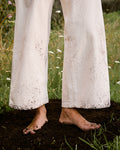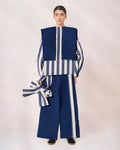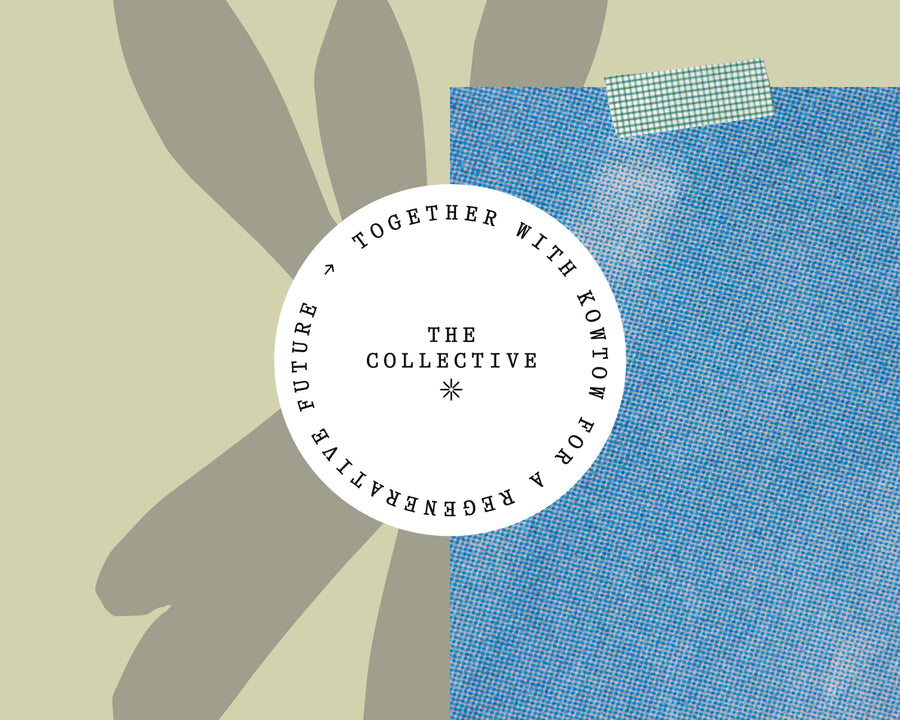“Plastic does not ever go away; it just breaks down into smaller particles and ends up in our oceans. We want to be a solutions provider, not part of the problem. So working towards a zero percent plastic mission seems obvious.”
Gosia Piatek, Kowtow Founder
At Kowtow we’ve been working for 17 years to completely eliminate all plastic derived materials in our clothing. A long and winding journey that has gone against industry conventions and led to finding natural alternatives so that now, we can claim completely plastic-free Fairtrade organic cotton clothing.
In the late 1950s plastic was marvelled for its strength and usefulness. The introduction of nylon, polyester and acrylic fabrics were applauded — easier to care for and more affordable. A fashion revolution had begun, but at that time, the dire consequences of these plastics and their impact on the environment were unknown. Terms like eco-friendly didn’t exist yet, and seventy years later our generation is left trying to undo this so-called material innovation.
Washing clothes made of synthetic fibre causes half a million tonnes of plastic microfibres to enter our oceans every year. Plastic can be found in any part of a garment, from the fibres it is made of to the buttons adorning your most comfortable cardigan or the zip that does up your favourite pair of sustainable jeans, even the elastic on the waistband on your ‘around the house’ track pants.
The base material of Kowtow clothing has always been 100% certified Fairtrade organic cotton, but we have used plastic garment components. These sit behind the seams, in the thread that holds a garment together, and in places like elastic in waistbands, cuffs and collar stiffeners. The current industry standard for these is to use plastic materials, so we’ve found ourselves returning to pre-plastic methods, used before the 1950’s, sourcing natural alternatives to create clothes that can return to the earth without harm.
Firstly, in a rather scary but bold move, we removed our best selling garment from our offering — the Kowtow leggings. A garment so synonymous with Kowtow that customers would come back year after year, but they contained elastane and the infamous prints had plastisol ink for screen printing, which was not environmentally friendly. It takes 200 years for elastane to decompose, a reality we didn’t want to continue contributing to. Separating elastane and plastisol from cotton is also a challenge, causing a hurdle to our goal of circularity'
“Although it was a tough decision to discontinue a product that we knew our customers loved, we believe our ultimate sustainability goals to eliminate plastic, reduce waste and support full circularity matters more to our business.”
Emma Wallace, Kowtow Managing Director
Buttons
Next to go were the buttons. We had been using buttons made from recycled hemp, but there was a resin binder in these. We asked ourselves — what is resin? It wasn’t something we could trace or recognise. We didn’t like that there was a resin in the button holding it together; we wanted something that was die-cut straight from a nut or shell. So we moved to natural buttons that can be returned to the earth or sea — responsibly sourced Oeko-Tex Standard 100 approved, made from agoya shell, mussel shell or corozo nut.
Quilting
Everyone loves the Kowtow Quilted Vests, which we now proudly line with Oeko-Tex Standard 100 certified organic cotton. When we first launched them, they were lined with GRS certified 100% recycled fibre derived from post-consumer plastic bottles. Every jacket using this lining was recycling up to 10 bottles — it was doing some good but wasn’t something that we could guarantee would return to the earth without harm.
Fibres
Constantly looking to improve our offering, we began to diversify the fibres used alongside organic cotton in our collections. As a global fashion brand, we needed to consider the different hemispheres and climates, so introduced ZQ merino wool coating, merino cotton-blended knitwear, garments made from Lenzing Tencel and ECONYL recycled nylon swimwear made from recycled fishnets.
But in 2019, another brave decision had to be made. As a business that puts people and the planet first, we made the call to get rid of all of those additional fibre products and focus solely on our first love, 100% certified Fairtrade organic cotton. A return to simplicity, making all of our garments from a single, natural fibre. A fibre that can be traced from seed to garment.

Trims
After deciding to focus on a mono-fibre, we never stopped looking at trim alternatives; the process just took time to trial and implement. We tested, making tweaks along the way to get to the range you see in our stores today. There are so many details of a piece of clothing that you can’t really see when you look at it. Like fusing, the stiffener in collars and cuffs and behind buttons and buttonholes, that gives a garment its shape and strength. The fusing we were using was made from industry-standard polyester and now is replaced with organic cotton and uses a formaldehyde-free adhesive.
Elastic
We like an elasticated waist here at Kowtow. Replacing the industry-standard synthetic elastic with Oeko-Tex 100 Standard natural rubber encased in organic cotton was a huge triumph for our team.
Cotton thread
From our August 2023 collections, we have achieved a major goal of replacing the industry-standard polyester cotton thread with 100% Oeko-Tex and Global Organic Textile Standard (GOTS) allowed organic cotton thread. A change that affects every garment made in a Kowtow collection.
All new Kowtow garments are now completely plastic-free, an achievement that our team is so excited to share. These things take time, they take research and testing, and it’s been a massive journey to get to this point. We are so proud to have a product that doesn’t contain any plastic material or components - 100% natural.





